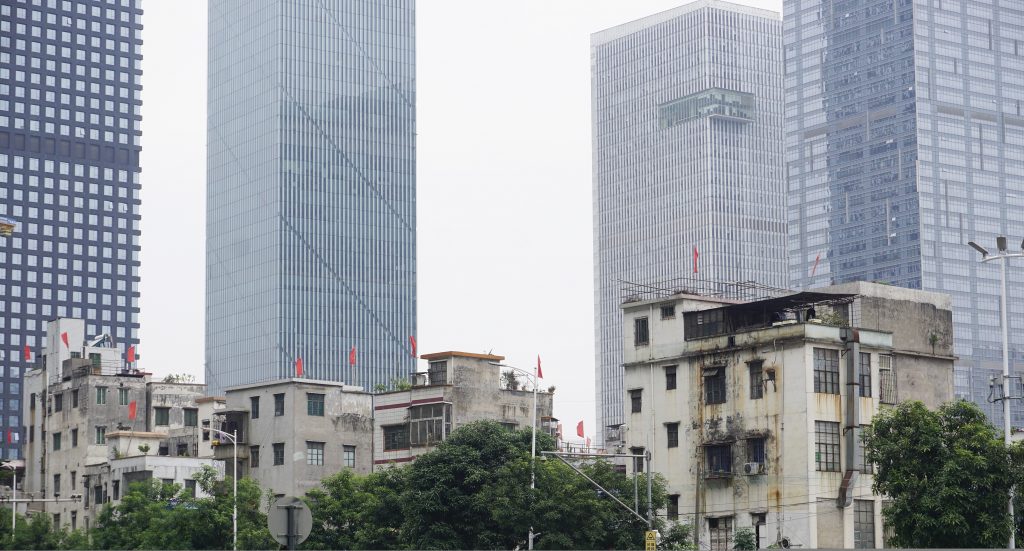May 2024 | Volume 25 No. 2
Life outside the Law in China
Listen to this article:
The Chinese central government has introduced many policies over the years to spur economic growth and curtail excesses such as corruption. But there have been unintended consequences.
For instance, policies to develop coastal cities have attracted millions of people from rural and northern areas seeking economic opportunity, but jobs and housing cannot keep up. To meet the demand, illegal housing and illegal street vending have flourished. Similarly, while campaigns have cracked down on activities such as illegal online lending, they have not eliminated them and only driven them further underground.
“Traditionally, we think the state is responsible for repressing illegal markets. But my observation is that in many circumstances, it actually enables their growth,” said Professor Peng Wang of the Department of Sociology, who is finalising a book on the topic with Dr Lin Wanlin, now with Sun Yat-sen University, titled Extra-legal Governance: The Social Order of Illegal Markets in China (to be published by Cambridge University Press in 2025).
The book aims to explain why and how illegal markets continue to thrive outside the bounds of the state and how participants mitigate their risk and uncertainty.
‘Legitimate’ illegal markets
Illegal markets come in two varieties – socially legitimate or not – with differing power imbalances, he said. For example, both illegal housing and illegal street vending have high social legitimacy, so the government often turns a blind eye to them.
“Unlicensed street vending is part of the informal economy, and it is facilitated by government policy on developing coastal cities, which encourages migration from inland areas. If migrants cannot find enough jobs, many of them become street vendors. Similarly, the arrival of illegal migrants has coincided with a government focus on commercialising land in major cities like Shenzhen, Beijing and Shanghai. The cost of housing has become so high that illegal housing markets have arisen,” he said.
The latter markets often centre on urban villages that are enveloped by cities and have become magnets for migrants. The original village residents are allowed to build flats and rent or sell them to each other, but they have capitalised on demand to trade with migrants, too, who are now their prime market. “This housing is cheaper than commercial housing and it helps middle- and lower-income groups settle in the city,” Professor Wang said.
The government treats these villages with a light touch so long as things do not get out of hand. Village committees therefore have introduced such things as non-binding informal certificates of title, lawyer’s testimonies and even contract-signing rituals to legitimise sales and leases. They also keep registries of transactions that anyone can inspect, and maintain dedicated WeChat groups that ensure everyone knows when a villager reneges on deals. “The village committees have a strong motivation to resolve disputes because they do not want to give the government reason to intervene in the market,” he said.
On the flip side of such arrangements are practices which have no social legitimacy and face market, political and legal risks. Professor Wang looked at how illegal online lenders and corrupt government officials mitigate these risks.

Illegal housing in Shenzhen. (Courtesy of Dr Lin Wanlin)
Less open exchanges
Online lenders acquire information about borrowers and will threaten non-payers with such things as text-bombing their contacts or publishing nude photos of them. The problem was fairly widespread until 2020, but an anti-crime campaign has eliminated many such practices.
Corrupt officials, however, have been more adaptive. They used to face little risk of investigation or punishment. But in 2013, President Xi Jinping launched his ‘tigers and flies’ anti-corruption campaign. More than two million officials were prosecuted, yet that has not halted corrupt practices. People still seek to bribe higher-ranking officials for appointments and favours. These exchanges now happen less openly, through social networks and connections as embodied in guanxi.
“The condition for initiating transactions is now based on close ties with each other and strong trust and commitment to the exchange. These transactions are less rampant, but they still happen among people in very close networks,” he said.
Professor Wang said his book is the first to provide a comprehensive framework for analysing how even strong states like China may enable illegal markets to flourish and how extra-legal governance emerges. It extends his earlier research on collusion between police officers and local gangsters in Chongqing in the early 2000s. Both projects have involved extensive interviews with participants and regulators, including more than 300 interviews for the current book.
“The existing literature on illegal markets and extra-legal governance has focussed on Western countries or dysfunctional countries. We are the first to analyse illegal markets and understand risks and solutions in China. It’s a very strong state, but still its policies can enable the growth of illegal markets,” he said.
Traditionally, we think the state is responsible for repressing illegal markets. But my observation is that in many circumstances, it actually enables their growth.

Professor Peng Wang

